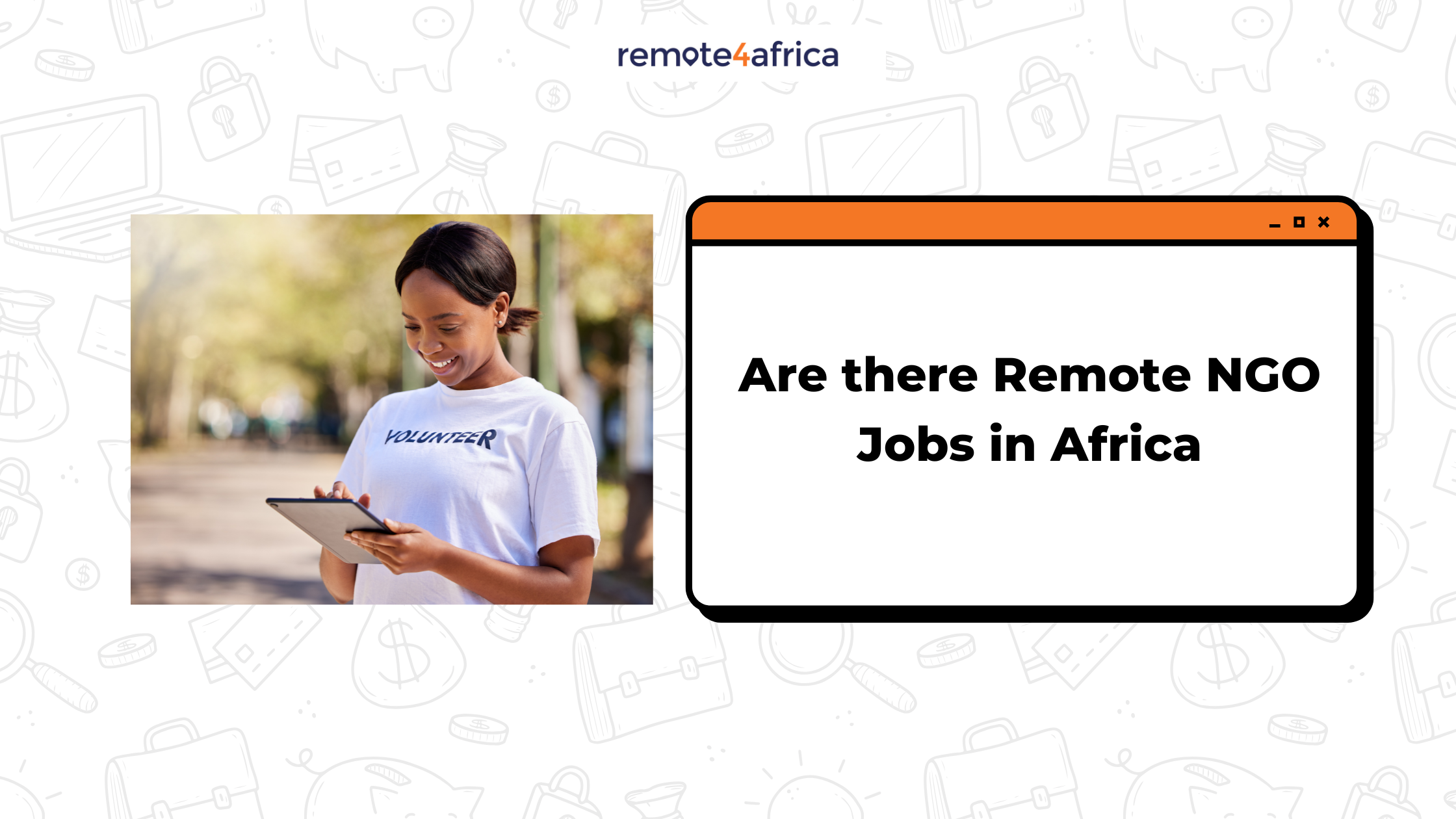Are There Remote NGO Jobs in Africa?
This article looks at - whether there are remote NGO jobs in Africa, where to find them, what skills are in demand and how to position yourself for success in this competitive field.

With hundreds or even thousands of NGOs operating across the continent, opportunities exist for professionals ranging from program managers to field officers, communications specialists and IT roles.
Today, professionals across industries—from tech and education to healthcare and development—are exploring remote NGO opportunities more than ever before. But how does remote work fit into the world of non-governmental organizations (NGOs)?
What is an NGO?
While NGOs are not a homogeneous lot and hence not easy to define, a number of similar definitions have been attempted for them. According to the United Nations Development Program (UNDP), an NGO is a “non-profit organization, group or institution that operates independently from a government and has humanitarian or development objectives.”
An IBRD document indicates that the term NGO includes “a wide variety of groups and institutions that are entirely or largely independent of governments, and characterized primarily by humanitarian or cooperative, rather than commercial, objectives.”
Not only are NGOs mostly not associated with the public sector of the economy, but they are also typically distanced from the private sector as well. Instead, they are considered part of the so-called “third sector” (also known as the voluntary sector, the voluntary and community sector, or civil society).
According to the African Union, the following are the basic characteristics of NGOs:
- Non-state actors that are not based in government.
- Organizations that are not created to earn or make profit.
- Organizations designed to produce a social good, e.g., to relieve suffering, provide social services, promote development, etc.
In a nutshell, any organization that is not a part of government qualifies as an NGO, but the term is commonly used to denote organizations that are not only nongovernmental but also do not work for profit, unlike private sector organizations, which are profit-driven.
Several international NGOs have made a significant impact in Africa through development and humanitarian work. Amnesty International advocates for human rights and justice across the continent. CARE International addresses food insecurity, gender-based violence, and disaster relief. Plan International promotes children’s rights and education, especially for girls, while IRC and Save the Children provide critical support in health, education, and refugee services in conflict-affected regions.
Do NGOs Hire Remotely in Africa?
Yes, remote NGO jobs are regularly available in Africa, and the trend is growing. While fieldwork and community engagement still require physical presence, many other roles can now be performed remotely. These remote-friendly NGO work areas include (but are not limited to):
- Program coordination and project management
- Communications and digital storytelling
- Grant writing and fundraising
- Data analysis and research
- Finance and administration
- Policy and advocacy writing
Vacancies in many of these organizations can be found on both their websites and various online job boards.
What Skills Are Needed for NGO Remote Work?
To compete and succeed in a remote NGO work career in Africa, candidates need a combination of education, technical skills, and soft skills.
Academic and Online Education
While many roles require a degree in areas such as international development, environmental science, social work, or public health, online learning can also help. Short courses and certifications from platforms like Coursera, edX, or Google’s non-profit offerings can also boost your resume.
Technical Skills
Remote NGO jobs often require technical abilities in a variety of areas, including:
- Digital literacy
- Grant and proposal writing
- Data entry and analysis
- Research and report writing
- Content creation and social media management
- Project management
Soft Skills
Since remote work is independent and communication-intensive, the following are critical:
- Empathy
- Time management
- Cross-cultural communication/collaboration
- Teamwork
- Initiative and problem-solving
- Adaptability
Tips for Succeeding as a Remote NGO Worker
Breaking into and thriving in remote NGO work in Africa or elsewhere requires strategy and intentional effort. Here are a few success tips:
Build purpose-driven CV/resume and online profiles: Showcase your alignment with social impact missions and highlight experiences that demonstrate relevant skills (e.g., volunteer work and community service).
Learn the tools of the trade: Familiarize yourself with cloud-based platforms like Slack, Zoom, Google Workspace, and other remote work tools, especially those that have NGO-friendly features.
Demonstrate cultural awareness: Many NGOs work across countries and cultures. Understanding how to navigate diverse teams and audiences is a strong asset.
Be proactive and communicative: Remote work requires taking initiative, asking questions when needed, and being clear in written and verbal communication.
Start with freelance or volunteer projects: If you’re just starting, freelance contracts or remote volunteering with smaller NGOs can build your experience and network.
Continue learning and improving: No matter your level of knowledge and skills, there’s always room for improvement. Constantly update yourself to remain competitive and keep in touch with the latest NGO trends.
Conclusion
Remote work adoption is expanding, including in the humanitarian and non-profit world. While not all NGO work can be done remotely, the rise of remote NGO jobs in Africa presents exciting new pathways for professionals who want to make an impact. Whether you're a researcher, consultant, writer, or digital strategist, there’s a remote work possibility for you in today’s evolving NGO landscape.
Ready to start your journey? Remote4Africa is the perfect platform to discovr remote NGO jobs that match your purpose and potential—right from wherever you are in Africa.
